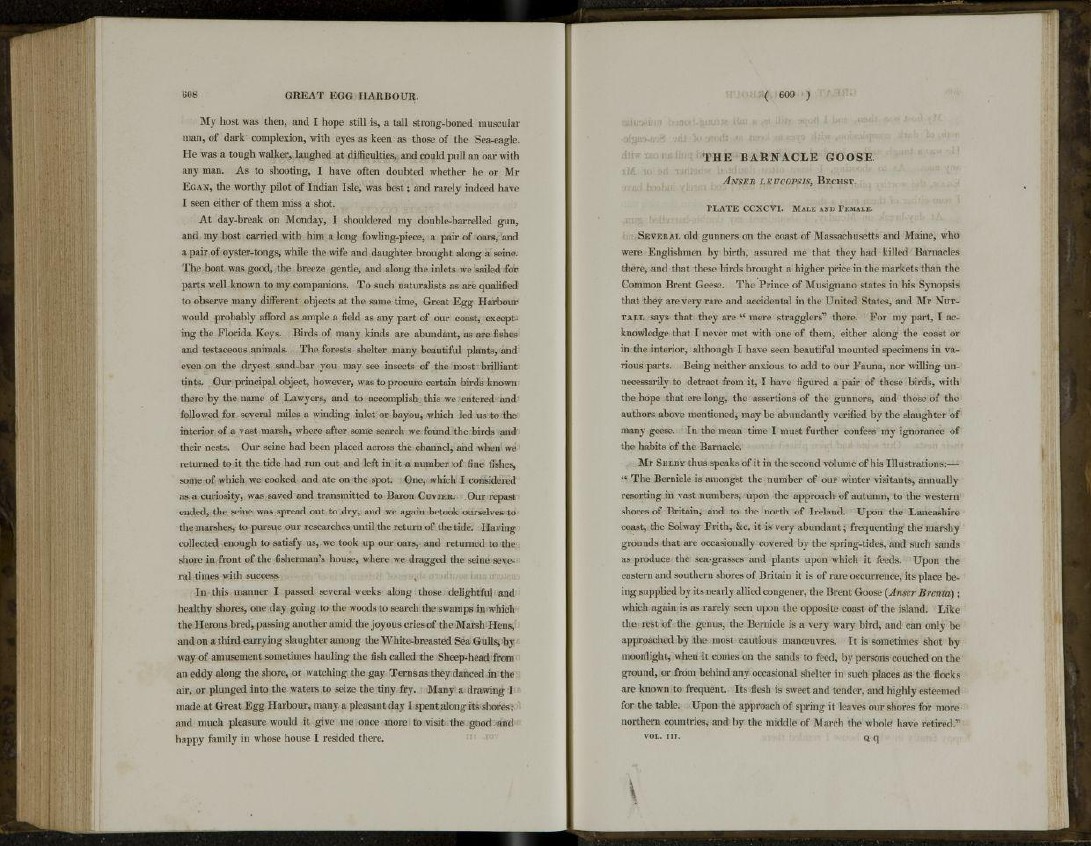
608 GREAT EGG HARBOUR.
My host was then, and I hope still is, a tall strong-boned muscular
man, of dark complexion, with eyes as keen as those of the Sea-eagle.
He was a tough walker, laughed at difficulties, and could pull an oar with
any man. As to shooting, I have often doubted whether he or Mr
EGAN, the worthy pilot of Indian Isle, was best; and rarely indeed have
I seen either of them miss a shot.
At day-break on Monday, I shouldered my double-barrelled gun,
and my host carried with him a long fowling-piece, a pair of oars, and
a pair of oyster-tongs, while the wife and daughter brought along a seine.
The boat was good, the breeze gentle, and along the inlets we sailed for
parts well known to my companions. To such naturalists as are qualified
to observe many different objects at the same time, Great Egg Harbour
would probably afford as ample a field as any part of our coast, excepting
the Florida Keys. Birds of many kinds are abundant, as are fishes
and testaceous animals. The forests shelter many beautiful plants, and
even on the dry est sand-bar you may see insects of the most brilliant
tints. Our principal object, however, was to procure certain birds known
there by the name of Lawyers, and to accomplish this we entered and
followed for several miles a winding inlet or bayou, which led us to the
interior of a vast marsh, where after some search we found the birds and
their nests. Our seine had been placed across the channel, and when we
returned to it the tide had run out and left in it a number of fine fishes,
some of which we cooked and ate on the spot. One, which I considered
as a curiosity, was saved and transmitted to Baron CUVIER. Our repast
ended, the seine was spread out to dry, and we again betook ourselves to
the marshes, to pursue our researches until the return of the tide. Having
collected enough to satisfy us, we took up our oars, and returned to the
shore in front of the fisherman's house, where we dragged the seine several
times with success. $
In this manner I passed several weeks along those delightful and
healthy shores, one day going to the woods to search the swamps in which
the Herons bred, passing another amid the joyous cries of the Marsh Hens,
and on a third carrying slaughter among the White-breasted Sea Gulls, by
way of amusement sometimes hauling the fish called the Sheep-head from
an eddy along the shore, or watching the gay Terns as they danced in the
air, or plunged into the waters to seize the tiny fry. Many a drawing I
made at Great Egg Harbour, many a pleasant day I spent along its shores;
and much pleasure would it give me once more to visit the good and
happy family in whose house I resided there.
( 609 )
THE BARNACLE GOOSE.
ANSER LEUCOPSIS, BECHST.
PLATE CCXCVI. MALE AND FEMALE.
SEVERAL old gunners on the coast of Massachusetts and Maine, who
were Englishmen by birth, assured me that they had killed Barnacles
there, and that these birds brought a higher price in the markets than the
Common Brent Geese. The Prince of Musignano states in his Synopsis
that they are very rare and accidental in the United States, and Mr NUTTALL
says that they are " mere stragglers" there. For my part, I acknowledge
that I never met with one of them, either along the coast or
in the interior, although I have seen beautiful mounted specimens in various
parts. Being neither anxious to add to our Fauna, nor willing unnecessarily
to detract from it, I have figured a pair of these birds, with
the hope that ere long, the assertions of the gunners, and those of the
authors above mentioned, may be abundantly verified by the slaughter of
many geese. In the mean time I must further confess my ignorance of
the habits of the Barnacle.
Mr SELBY thus speaks of it in the second volume of his Illustrations:—-
" The Bernicle is amongst the number of our winter visitants, annually
resorting in vast numbers, upon the approach of autumn, to the western
shores of Britain, and to the north of Ireland. Upon the Lancashire
coast, the Solway Frith, &c. it is very abundant; frequenting the marshy
grounds that are occasionally covered by the spring-tides, and such sands
as produce the sea-grasses and plants upon which it feeds. Upon the
eastern and southern shores of Britain it is of rare occurrence, its place being
supplied by its nearly allied congener, the Brent Goose (Anser Brenta) ;
which again is as rarely seen upon the opposite coast of the island. Like
the rest of the genus, the Bernicle is a very wary bird, and can only be
approached by the most cautious manoeuvres. It is sometimes shot by
moonlight, when it comes on the sands to feed, by persons couched on the
ground, or from behind any occasional shelter in such places as the flocks
are known to frequent. Its flesh is sweet and tender, and highly esteemed
for the table. Upon the approach of spring it leaves our shores for more
northern countries, and by the middle of March the whole have retired "
VOL. in. Q q
\